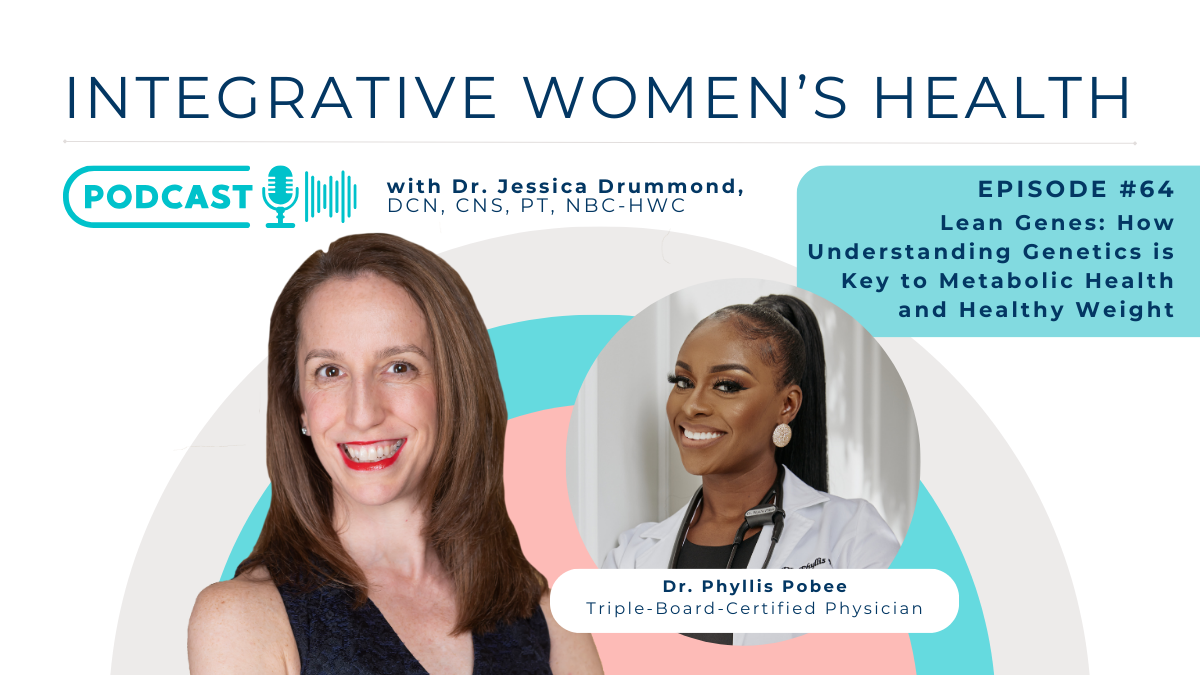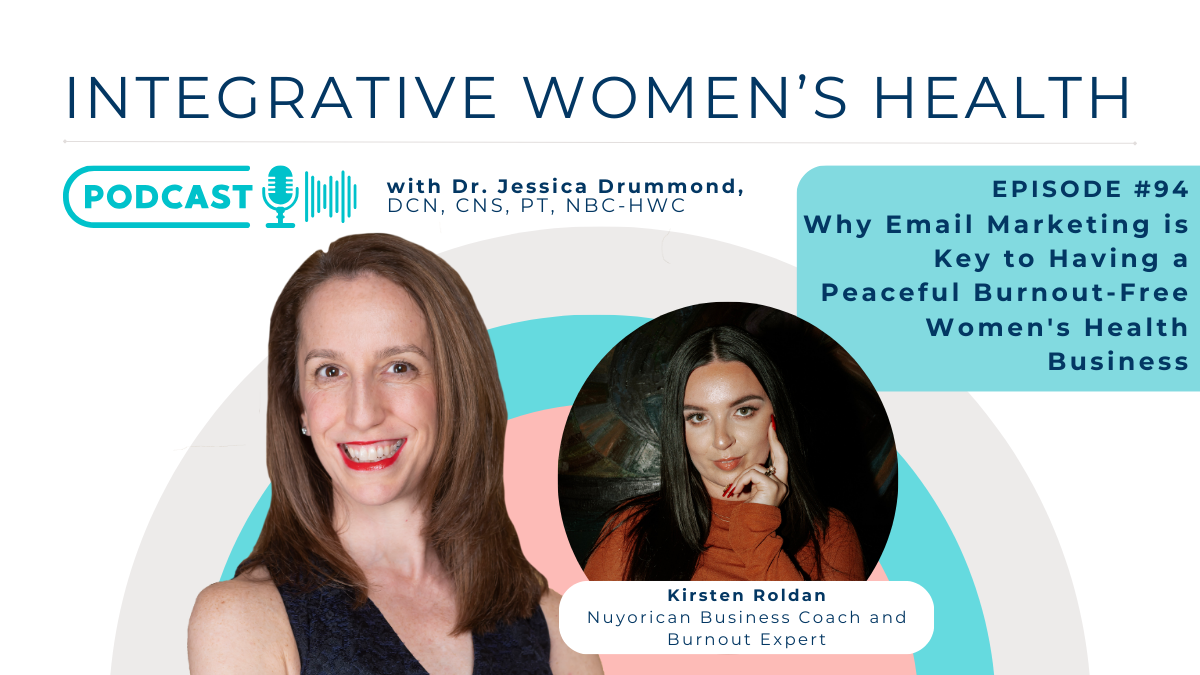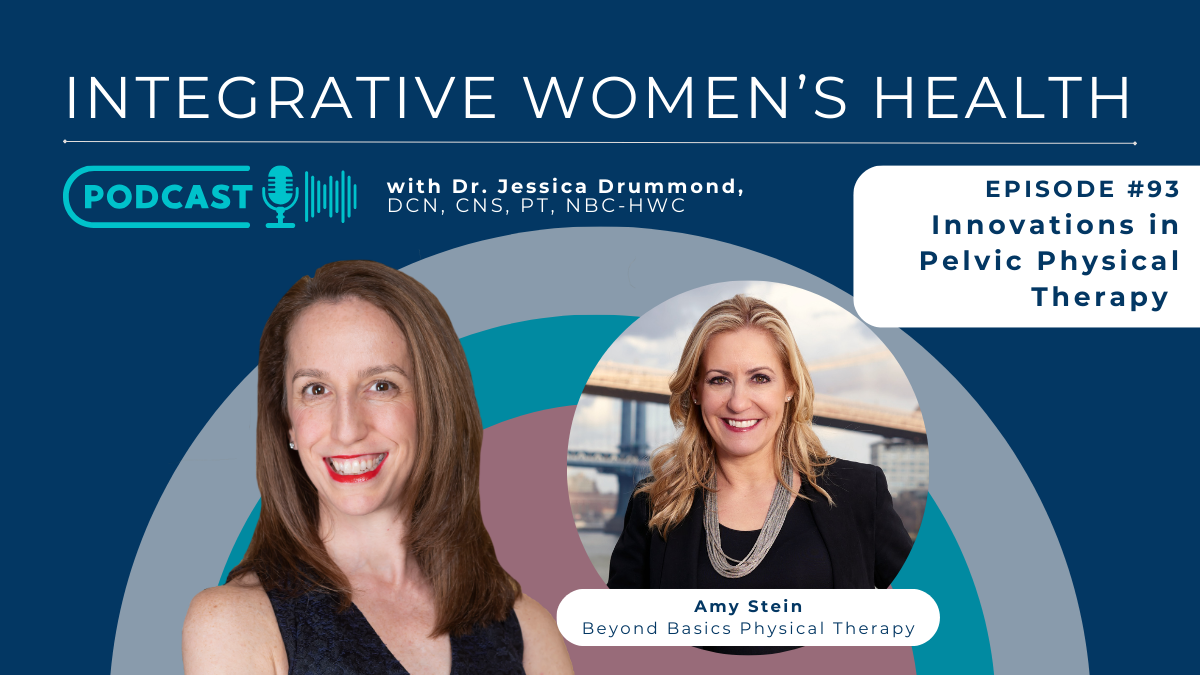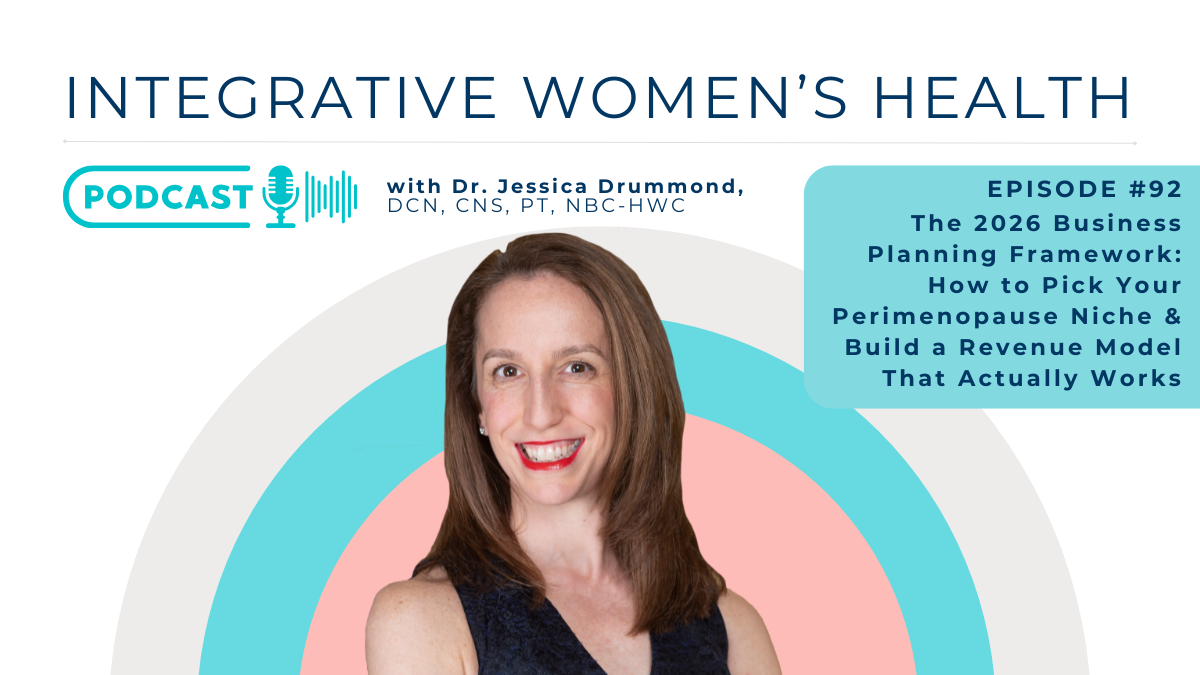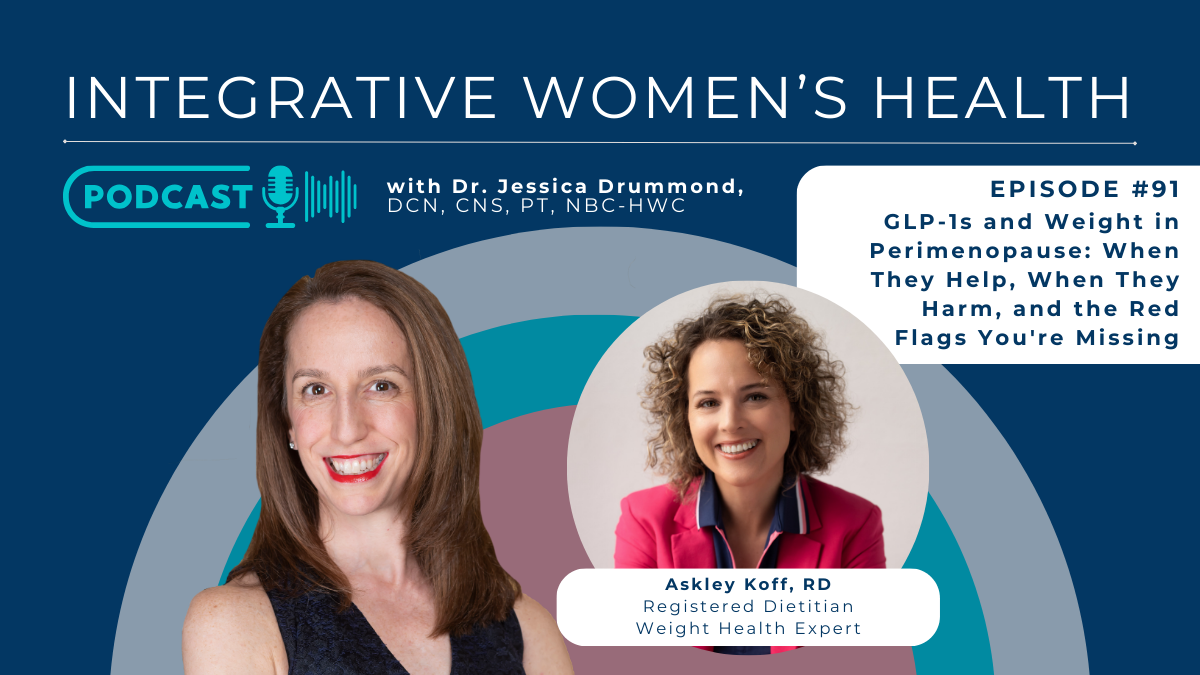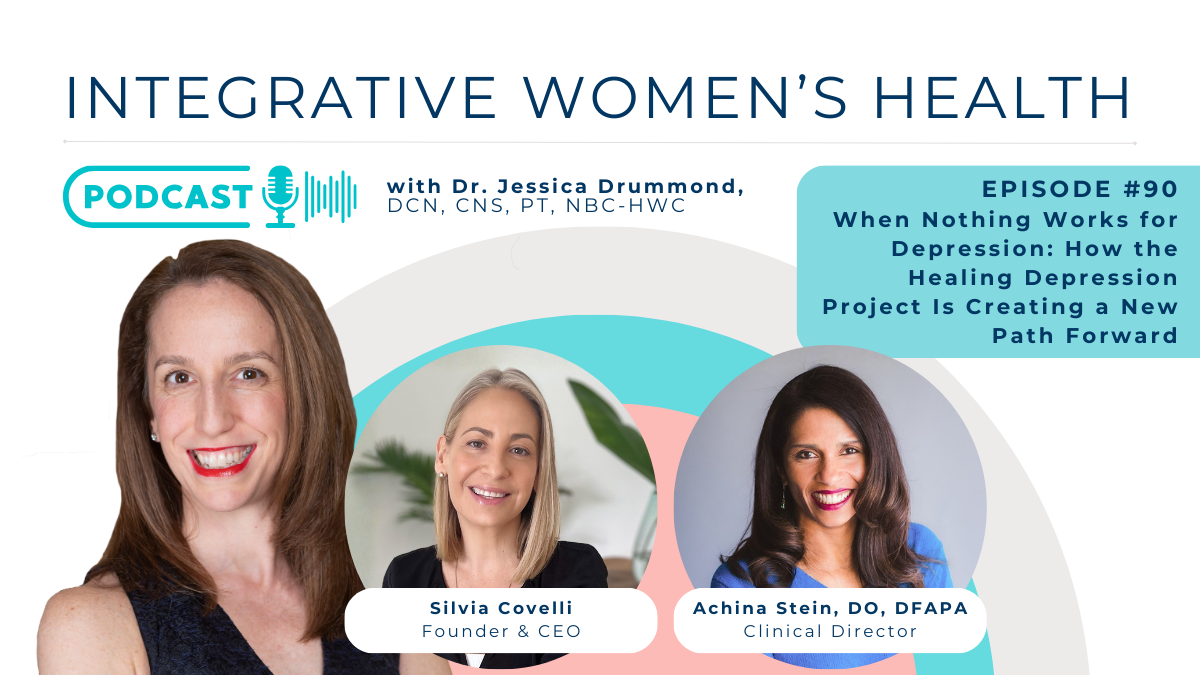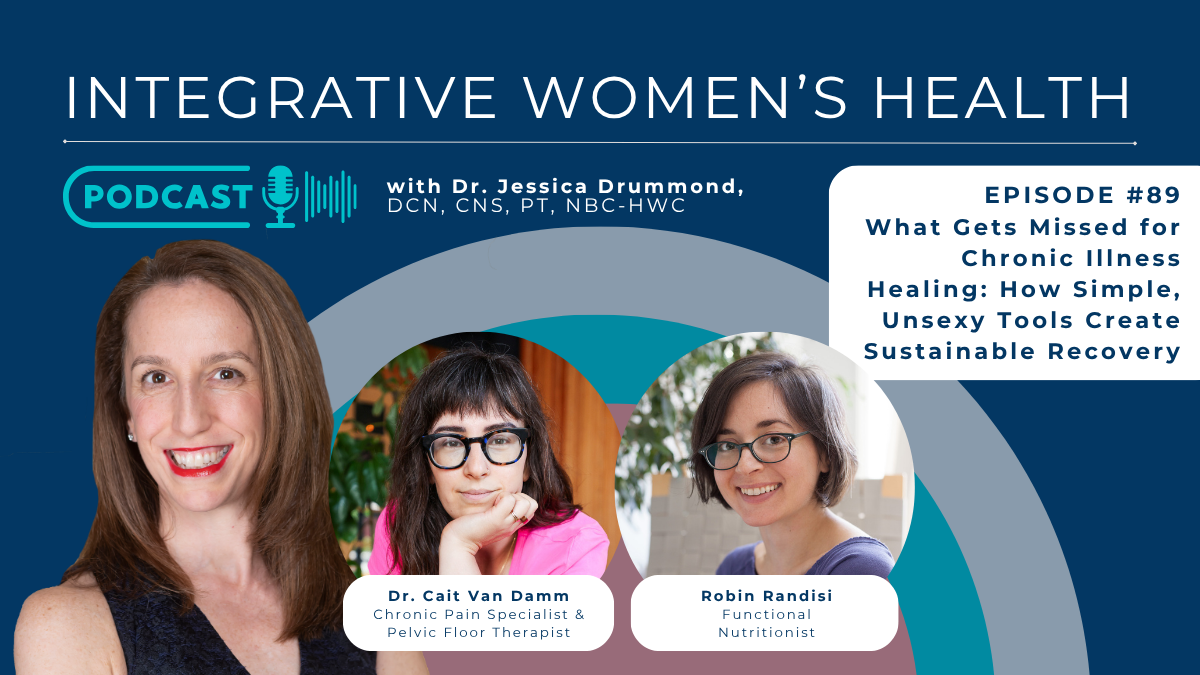Follow Us for Free:
About the episode
“Weight loss resistance is never isolated. You never just have weight loss resistance and everything else is great.” – Dr. Phyllis Pobee
For those of us dealing with the combination of hormonal changes postpartum or in perimenopause periods alongside chronic illnesses such as endometriosis or MCAS, our bodies, and especially our mitochondrial health, are under a heavy burden. When you layer that with genetic predispositions and vulnerabilities, that’s almost like having to dig yourself out of a hole that’s twice as deep.
Chances are, the problem isn’t that you’re not doing enough movement or not restricting your diets enough. Many of us and our clients really struggle with feeling the need to do more and go harder. This is one of the reasons why genetic testing can be so supportive. Understanding your genetics gives you a framework to support your body in the way that works best for you, mitigate any vulnerabilities that may exist, and get to a state of metabolic health.
Today, I’m excited to introduce you to Dr. Phyllis Pobee, the author of Lean Genes. Dr. Phyllis is a triple-board-certified expert in weight loss medicine, family medicine, and aesthetic medicine and a leading authority in science-backed weight loss. She has an interesting way of approaching weight loss that factors in individual genetics and support based on the patient’s unique history and needs.
In this conversation, Dr. Phyllis and I discuss her weight loss journey, the role of genetics in weight loss and metabolic health, the challenges women face with weight loss postpartum and during perimenopause, why genetic testing is a gamechanger, how addressing genetic predispositions can make a significant difference, the impact of stress on metabolic health, what it looks like to achieve sustainable health and weight management, and more.
Enjoy the episode, and let’s innovate and integrate together!
About Dr. Phyllis Pobee
Dr. Phyllis Pobee is a triple-board-certified physician specializing in genetic weight loss for women over 30. After struggling with her own weight and losing 100 pounds through the power of genetic insights, Dr. Phyllis founded GeneLean360°, a program designed to empower women to achieve sustainable health by unlocking the secrets of their DNA. She is the author of Lean Genes: A Physician’s Guide to Genetic Weight Loss, where she shares her groundbreaking approach to personalized nutrition, hormone balance, and sustainable health. Dr. Phyllis is passionate about helping women break free from the cycle of fad diets and discover a lasting path to vibrant health and confidence.
Highlights
- Dr. Phyllis’ struggles with weight loss and her recognition of the impact of genetics
- Why Dr. Phyllis wrote Lean Genes and what you’ll learn from the book
- Understanding the twelve GeneLean360° Genetic Avatars
- Mitochondrial function decline after 45 and the effects on our weight
- The impact of hormonal changes in perimenopause and menopause on weight gain
- Detox pathways and the role of genetics in detoxification
- How chronic illness can exacerbate issues stemming from genetic vulnerabilities
- Why Dr. Phyllis recommends starting with genetic testing
- Recognizing that weight loss resistance is never a standalone issue
- How your genetics influence cortisol sensitivity and weight gain
- Preventative health and why you need targeted strategies based on genetic insights
- Challenges in implementing recommendations based on insights and the role of coaching
- Dietary needs based on individual metabolic types
- Why Dr. Phyllis isn’t a big advocate for GLP-1 agonists
- The significance of mindset in achieving long-term health goals
Connect with Dr. Phyllis Pobee
- Dr. Phyllis Pobee’s Website | GeneticWeightLoss.com
- Dr. Phyllis Pobee’s Book | Lean Genes: A Physician’s Guide to Genetic Weight Loss
- Dr. Phyllis Pobee on Facebook
- Dr. Phyllis Pobee on YouTube
- Dr. Phyllis Pobee on Instagram: @GeneLean360
- Dr. Phyllis Pobee on TikTok @yourweightlossdoc
Ready to revolutionize your career and grow your practice?
- What is the next step in your career in women’s health and wellness? Start here: https://integrativewomenshealthinstitute.com/start-here/
- Integrative Women’s Health Institute on Instagram | @integrativewomenshealth
- Integrative Women’s Health Institute on YouTube
Learn more about The Integrative Women’s Health Institute’s Programs.
Click here for a full transcript of the episode.
Dr. Jessica Drummond 00:00:03 Hi and welcome to the Integrative Women’s Health Podcast. I’m your host, Doctor Jessica Drummond, and I am so thrilled to have you here as we dive into today’s episode. As always, innovating and integrating in the world of women’s health. And just as a reminder, the content in this podcast episode is no substitute for medical advice, diagnosis, or treatment from your medical or licensed health care team. While myself and many of my guests are licensed healthcare professionals, we are not your licensed healthcare professionals, so you want to get advice on your unique circumstances. Diagnostic recommendations treatment recommendations from your home medical team. Enjoy the episode. Let’s innovate and integrate together. Welcome back to the Integrative Women’s Health Podcast. I’m your host, Doctor Jessica Drummond. I am so excited to introduce you today to Doctor Phyllis Pobee. She is just an absolute delight. I loved her and she has a wonderful book out called Lean Genes, and I really like her approach to weight loss, weight loss resistance, metabolic health. This is a huge problem for women through hormonal shifts, through stressors, the day to day push of do more, achieve more, be more stress is a key driver of metabolic dysfunction and weight loss resistance.
Dr. Jessica Drummond 00:01:48 She has a really interesting way of looking at it. She has an excellent assessment tool through utilizing genetics, and she has a wonderful full program to really support people in how they optimize their metabolic health. I was really inspired by her to do an even deeper dive into this topic. I think it’s so important. So enjoy this interview and I’ll meet you on the other side. We’ll take it and put it into action in your practice this week. Hi, and welcome back to the Integrative Women’s Health Podcast. I’m your host, doctor Jessica Drummond, founder and CEO of the Integrative Women’s Health Institute. I really am excited to dive in with Doctor Phyllis Pobee about her approach to healthy weight and metabolic health related to genetics. So welcome, Doctor Phyllis.
Dr. Phyllis Pobee 00:02:49 Thank you so much for having me. I’m so excited for our conversation today.
Dr. Jessica Drummond 00:02:53 So tell me, first of all, what is your story? How did you get interested in medicine, particularly the subspecialty.
Dr. Phyllis Pobee 00:03:02 Yes. So I’m someone who, ever since I was young, wanted to be a physician.
Dr. Phyllis Pobee 00:03:06 And so at the same time as pursuing this rigorous medical training and becoming a family medicine physician, I was struggling with being overweight. I knew the perils of being overweight. Of course, it is something that affects every organ system. It’s the next smoking and I would do anything. I would do cabbage soup diet, I would do the keto diet, and I would rapidly lose and then gain back more, right? The losing some muscle mass and then gaining back even more fat cells. And so I knew I was slowing down my metabolism, and I was putting myself in a worse and worse position each time I did a restrictive diet like that. And well, after I had my first, I wanted to lose weight before I had my second child. And then I found myself. By the time I had my second child, that I was now £100 overweight. And that was really embarrassing. I think I suffered with a little bit of depression because I couldn’t show up as the physician I wanted to be.
Dr. Phyllis Pobee 00:04:03 I couldn’t show up as the mom that I wanted to be, and I was really, truly at a loss. And I knew it maybe had to do with something more personal, more cellular. And I started learning about personalized medicine and genetics and starting to be able to interpret some of these genetic reports that were available on the market at the time. I then became board certified with the American Board of Obesity Medicine. So combining that with my knowledge in obesity medicine, family medicine, my own personal experiences with trying to lose weight and keep it off genetics was like game changer for me. It explained so much about what I was doing wrong. Even things where you think that over exercising is the answer. But then it showed me that I was someone who was struggling with excess cortisol and not being able to get rid of excess cortisol. It showed me the root cause of a lot of my cravings. So when you eliminate cravings, a lot of people will tell you it makes weight loss so much easier. It almost becomes a no brainer.
Dr. Phyllis Pobee 00:05:06 So I never, ever wanted to be an entrepreneur. But looking in the space of genetic weight loss, no one was really doing it. And I started off doing it in my own practice, you know, helping women. But when we got our own genetic testing kit, which we now have with Gene lean 360, we’ve just become virtual. So now we work with women all across the United States, really all across the world, but predominantly women in the United States. So I’m an entrepreneur now, and I’ve now written a book. So it’s so wonderful.
Dr. Jessica Drummond 00:05:35 So I’m going to take a brief detour and ask you about that. As a person who’s written a couple of books and worked with others who’ve written books, writing a book is really hard. What is really the core message of your book?
Dr. Phyllis Pobee 00:05:47 Oh my goodness, this book is my baby. It’s like always behind me cheering me on because it was like my third child. It’s called Lean Genes A Physician’s Guide to Genetic Weight loss. Eat what you love, lose weight for good, and break free from diets and medications.
Dr. Phyllis Pobee 00:06:01 And so I wrote this book because I. For me, when you get into a field and you’re doing it all the time, you just assume everyone knows about genetics and weight loss. And I would have so many calls with women and they’re like, I’ve never heard about this. I’ve. And then physicians were telling me, I’ve never heard about this. And so it really prompted me to talk about genetics and how it really is something that can help women lose weight in this permanent way by looking at themselves from a holistic point of view, where it’s not just getting rid of the shame and the blame, but also looking at what’s the full picture of my health and how can I improve it in a personalized way. And that’s what led me to writing the book so that it could be accessible to more people. But also when I realized we had something really proprietary in terms of our genetic avatars. So that’s what the book talks about as well. I’ve gone back and looked at the hundreds of women that I’ve worked with, even going back and looking at my report and breaking up all the genes into 12 different genetic avatars, so that makes it way more accessible.
Dr. Phyllis Pobee 00:07:02 It’s helped us make it scalable, because now we’re able to take my protocols and say, well, if someone is, for example, dopamine driven, if that’s the reason that they’re having cravings, or if someone is, for example, a fatigue fighter having issues with their genes, with mitochondria or mthfr, we can tackle it from that side point as well. So being able to talk about those avatars was a huge reason to write the book. And I also have the quiz Genetic Avatar. So anyone that wants to check out that quiz, it’ll give you an idea of what these avatars are about.
Dr. Jessica Drummond 00:07:34 That’s super valuable. So give us some examples of some of these avatars that might be particularly applicable. I guess it could be across any age since we’re looking at genetics. But a lot of our community are women, particularly those kind of in the postpartum to perimenopause time frame who might be struggling with weight loss related to hormonal shifts or weight loss resistance, where everything they did before is not working as well.
Dr. Jessica Drummond 00:08:07 So that’s not directly a genetic issue, but are there some particular avatars that seem to have this problem more than others during those hormonal shifts?
Dr. Phyllis Pobee 00:08:19 Yes. Oh my goodness, what a wonderful question. So it is a genetic problem. So most of our problems are genetic problems because genes are the blueprint for everything. And so I like to call it mitochondrial meltdown. This is a big reason why women after 45 or sometimes earlier, some women have menopause of course happening earlier where you start to have this more than men. So a lot of people ask me, why do you only work with women? And I say, well, men can enter it in fast and drop like £40 and, you know, a couple months. I mean, there’s other, you know, plus or minus, but for the most part and for women, we have an extra layer of complexity when it comes to our hormones. So what is really happening post 45 is mitochondrial function declines and not for everyone. But as you know, the mitochondria is a power plant for the cells.
Dr. Phyllis Pobee 00:09:10 And so your genetics will actually tell you the variance in certain genes will tell you if you are more predisposed to having issues with mitochondrial function. So for example, if we’re looking at the PGC gene, which regulates mitochondrial biogenesis, or looking at genes that impact energy metabolism, or genes specifically part of complex one in the mitochondrial respiratory chain, that’s going to give you information if you are going to struggle from this mitochondrial meltdown. And not only that, but estrogen actually protects the mitochondria. So when we’re going through perimenopause and menopause, that drop doesn’t just affect your mood or your waistline. It crushes your cellular energy. So cue the brain fog and the midday crashes and the crippling fatigue and that weight gain around your abdomen and your belly. So another layer of genes on top of that, before I go and explain that a bit more is detox genes. So if you have sluggish detox genes like GST and one GST, one source, two Mthfr, you can have toxin buildup. So then this means that you’re further damaging your mitochondria and blocking ATP production, because now your body is not able to get energy in and out because of toxin buildup.
Dr. Phyllis Pobee 00:10:32 And so then your body’s inflamed, you’re fatigued and you’re you’re overwhelmed. So what happens and why this is important to understand what’s going on from a genetics standpoint If you’re having issues with excess estrogen, you’re not able to detox and get rid of estrogen. Or if you’re having issues with your mitochondria. So that would make you a fatigue fighter. If you’re having issues with your estrogen, I would call you hormone havoc. You need to know if you’re either one of these, because a lot of women will start dieting harder. They think that they actually need to diet more. Oh my gosh, I got to double down more restriction when you are restricting your body. We already know that the soil our food is grown in is not the same soil we have 3040 years ago. And so now we already are not getting enough nutrients from our food. And now you’re depleting even more nutrients by just I’m just going to eat one meal a day, even less nutrients. And then you’re missing important mitochondrial repair nutrients like CoQ10, carnitine, magnesium, malate.
Dr. Phyllis Pobee 00:11:30 So that is important because now you’re not allowing the mitochondria to repair. And that further worsens what’s going on. When I call you a fatigue fighter. And the next thing to understand is detox pathways. So a lot of people talk about detox. I was trained in medical school. Oh, if you have a liver, you should be able to detoxify, which isn’t the case. And so you want to understand where there’s issues and detox pathways. What kind of issues it’s causing in terms of estrogen access, and then targeting that so that you’re able to combat a lot of the weight gain that we see that happens around perimenopause. And then to further that just a little bit quickly, when we talk about after you have your baby, because I can really relate to that. After I had my kids, I felt like a totally different woman. And think about if you’re nutrient deficient just for yourself, but now being nutrient deficient for producing another human being, that further worsens where you are from a cellular standpoint, that worsens any type of nutrient deficiency.
Dr. Phyllis Pobee 00:12:31 And I like to talk about nutrients as almost the fuel. You know, if we think about our little white blood cells like firefighters, that’s the fuel that they’re using in their hose to put out inflammation, and they can’t do that with the necessary nutrient. So that can worsen things like chronic inflammation, weight gain, bloating, etc..
Dr. Jessica Drummond 00:12:50 Yeah. So in our community and in my practice, we work with a lot of women in the perimenopause transition or earlier, who also have an overlay of chronic illness, whether that’s endometriosis, chronic fatigue issues, MCAS, dysautonomia and increasingly long Covid, which all have some mitochondrial stressors related to them and chronic inflammation. So I think what you’re trying to say here is that you can have these genetic predispositions to having vulnerabilities, and then if you layer on whether it’s a hormone shift or perimenopause or the complexity of a chronic illness, it’s like a double hole you’ve got to dig out of.
Dr. Phyllis Pobee 00:13:38 Yes, exactly. And then it’s giving you that laser focus. Because I always like to say test focus.
Dr. Phyllis Pobee 00:13:43 So you will know that something that you might deal with coming up into perimenopause and is something that you can work to start replenishing some of those mitochondrial nutrients beforehand so that you’re not dealing with some of as you mentioned, having mitochondrial dysfunction affects a lot of chronic illness. So it can prevent a lot of chronic disease in the future as well.
Dr. Jessica Drummond 00:14:05 So in your story, there was a lot of your weight going up and down through your life, which changes your body metabolically. So where do women, you know, they had healthy weight their whole life, and then they either encountered the shifts of perimenopause or chronic illness. And something has changed such that I was definitely a person. I never had a weight issue and really, even not now, but I my weight definitely changed when I got long Covid and when I hit menopause at the same time. But before that I was a very heavy exerciser, which now we’re learning potentially wasn’t the best for my long term metabolic health and mitochondrial health in particular. So I work with a lot of really driven women who, like you said, they’ve either been up and down, but it’s not like they haven’t done anything.
Dr. Jessica Drummond 00:15:00 They’ve in fact maybe overdone it to some extent. So how do we unwind that? Where do we start?
Dr. Phyllis Pobee 00:15:08 That’s the story of our lives. I say start with the genetic test. For me, it was eye opening because I was exercising morning and night and I still was £100 overweight. You would think that would have been an eye opener for me, but I was like, oh, maybe I should exercise three times a day. Like, that was never the solution to do less. If I wanted to spread it into all aspects of life. There’s so many aspects in life where just resting and rejuvenating ourselves. We can come back and come back stronger. So it really is like a societal and a health shift that we need to make where it’s okay to do less. But it’s difficult when you don’t know where to put your efforts. So instead of having like a laser focus in terms of, oh, I’ll just do this one thing and I know it’s going to get me my results. We start to spray and pray and just do all the things and like something’s got to work and then we end up burned out and worse off.
Dr. Phyllis Pobee 00:15:59 So I always say test, don’t guess. When people come to me, I’m like, I would love to tell you, but let’s just test and do it once and for all.
Dr. Jessica Drummond 00:16:06 Yeah, genetics which aren’t going to change. And then you find yourself in one of these categories. Do you essentially have a protocol that will work even if the mitochondrial system is under stress, or even if it’s overlaid with some inflammatory issue, whether it be like arthritis or any chronic pain condition, obviously a person in that condition will start slower. But it seems like if you can kind of either self-identify or identify with you within your digital practice, kind of which category you’re in, then the execution becomes very clear.
Dr. Phyllis Pobee 00:16:46 Exactly and very similarly in the work that you do to help women repair their mitochondria or work at the root cause of what’s going on with their chronic disease. This is what we’re doing with weight loss. So weight loss resistance is never isolated. It’s not like, oh, you just have weight loss resistance and everything else is great.
Dr. Phyllis Pobee 00:17:04 Usually spirals into something else. Or beforehand women will say, oh, I have no medical history. Oh, but I had fibroids or but I had a hysterectomy. So they’ve had this history of inflammation or they’ve had this history of insulin resistance. And so just really tying it all together so that we’re not looking at everything linearly or we’re just we’re looking at it as a full picture to say this condition can be tied to other inflammatory conditions that you might have and then can be tied to things like stroke cancers down the line. What we’re doing is just giving women a bigger toolbox to understand, okay, you might have genetic variants and your ability to detox excess estrogen. So you are going to struggle with estrogen dominance. Now a lot of women, they don’t start looking at that until they get into menopause. But you need to understand like for example, variants in the comp gene are going to slow down your estrogen clearance. So if you’re having bloating and PMS and mood swings and weight gain, you can actually do things that can help reduce the amount of estrogen that you have and help estrogen clearance by improving your detox pathways, by improving your estrogen clearance, and that you don’t struggle with these other symptoms down the line.
Dr. Phyllis Pobee 00:18:14 So it’s going to benefit everything. Another thing that is really kind of been a hot topic, I would say is cortisol. Everyone’s like wanting to know, should I eat peanut butter at night before I go to. I don’t know, it’s a new one. My friends always text me things they see on TikTok. I want to block them. but they’re my friends, so I don’t.
Dr. Phyllis Pobee 00:18:32 Eat the.
Dr. Jessica Drummond 00:18:33 Protein at night trend.
Dr. Phyllis Pobee 00:18:35 Which, yeah. Should I eat a scoop of peanut butter at midnight?
Dr. Phyllis Pobee 00:18:38 I’m like, get off my phone. But all our friends do this because all of our friends are high achieving women, and we all often carry a lot of stress in our bodies. But there’s actually genetics that will make you hyper responsive to stress hormones like cortisol. So that means that, of course increased belly fat insulin resistance. And so there’s a gene, the GnRH three C1 gene that is going to affect your cortisol receptor sensitivity. So you might have the same stressful event as somebody else. But that cortisol will linger around longer.
Dr. Phyllis Pobee 00:19:08 The effects of the cortisol will linger around longer. Your body will stay in fat storage mode a lot longer. So for these women, we do have to be very targeted in terms of, okay, how do we make sure that we do bring that cortisol level down? What are the cortisol protocols that we’re going to give you that are targeted to those specific genes so that you’re not dealing with all that belly fat, all of those stressors that come with cortisol sensitivity. There are so many things that you can try and do. Like, I mean, leptin resistance is another one that comes up in our genetics. But the fact of the matter is that if you’re trying to do all of these things at once, it’s impossible. But if you’re doing a few of them because, you know, it showed up on your genetics and this is the reason why you’re dealing with weight loss resistance. It makes it so much easier.
Dr. Jessica Drummond 00:19:52 So for that category, my strategy of moving to the Mediterranean is probably going to be helpful.
Dr. Phyllis Pobee 00:19:59 For the cortisol. Yeah. Are you in that category? Probably I gotta I gotta say like we just got our new kids aren’t they? So cute. So I gotta send you one so you can know for sure what category you’re in.
Dr. Jessica Drummond 00:20:11 I know I’m getting more and more curious through this interview. You know, when we think about estrogen dominance, we’re always looking at committee and and the other detox pathway genetics. And I’ve done some genetic work in my practice. We’ve used opus 23 which is a lot more complicated of a system. And what I learned about it from a nutritional genetics perspective is that because there’s so much overlap, it didn’t really occur to me how important it would be to be this precise. When we’re figuring out the laundry list of options for helping people actually get to a state of metabolic health, because really, that’s at the root of everything.
Dr. Phyllis Pobee 00:20:59 Yeah. It is. And I’m just grateful that we’re moving as a society away from reactive medicine, because that’s hard for people. Like they’ll say to me, oh, if my tooth was chipped, I would pay $10,000 to fix it.
Dr. Phyllis Pobee 00:21:11 But preventative health, I don’t know. But now we’re getting to a place where people understand that, hey, genetics are the story of me. I want to know what is potentially in my future so that I can work to mitigate it, or I can work to make changes that will make a difference. So that’s why it’s worthwhile. Yes. As you mentioned, there’s a lot of complicated panels out there, which is what I love about having the avatars, having targeted panels so that you’re not just getting a huge long recipe list of things that don’t mean anything, that you can’t give actionable change to a client that makes sense for them. So that’s important as well the interpretation of these reports.
Dr. Jessica Drummond 00:21:53 So in our community, you know, we educate health and wellness coaches. And really my thinking on kind of the evolution of medicine in the next 10 to 20 years is really going to be that we’re are getting closer and closer. And I think to have more and more tools where we can utilize, whether it’s data analytics, genetics, analytics, even AI tools to help us determine the what to do.
Dr. Jessica Drummond 00:22:21 The challenge then becomes the actual implementation of the what to do. So that’s where the coaching piece comes in. So in your programs, do you have some level of support for your clients how to implement this in their super busy lives? Because obviously you were dealing with this as a mom of two young kids. So you’re very familiar with. Easier said than done to know what to do. It’s not the same as actually doing it.
Dr. Phyllis Pobee 00:22:52 So true that accountability piece is so necessary, but I think a lot of us forget that even the best athletes in the world have coaches. Having a coach is so necessary because they can get you where you want to be quicker. And yes, of course, we’re in the land of Google and AI and we could try to piece things together, but working with someone that’s not only been there but understands the limitations of time. But now we have your genetic report to tell us what are the best foods you should be eating? How should you supplement? What are the best exercises that is going to save you the most amount of time? Because this is going to let you know that, hey, you don’t really necessarily need to be in the gym seven days a week.
Dr. Phyllis Pobee 00:23:34 These are the workouts that you could do in 30 minutes based upon your genetics, that are going to get you the physique or get you the results that you’re looking for, that is important. I think a lot of women come to me on like vegan diets. They’re doing blood type diets and it’s just not applicable. And like we talked about, not having the right nutrients can actually worsen inflammation. And they don’t feel great and they think they’re doing all the right things. It’s just a waste of time. So if you’re a busy mom and you want to stop wasting time, that’s why genetics is incredible.
Dr. Jessica Drummond 00:24:03 So I want to cover two hot topics before we go in the world of weight loss resistance. One is protein. Now, certainly metabolically, having a relatively high protein diet in general is good. But are there any of your subcategories, your avatars, where you know the kind of 120g of protein per day, maybe a little excessive or not enough?
Dr. Phyllis Pobee 00:24:31 Yeah, that’s an awesome question. So if you’re a carb converter, you are someone that I am.
Dr. Phyllis Pobee 00:24:38 And I thought that I just needed to basically do keto diet, like be super, super low carb and lots of protein and lots of high fats. But when you are carbon converter, you can actually metabolize a bit more carbs. Whole carbs obviously, and going low carb and high protein is something that your body doesn’t process very well. That information was a big game changer for me, because I just thought that I just needed to eat less and less carbs. Knowing the type, the specific type of macros that works for your body is crucial. But I love how you mentioned protein is a hot button topic because protein, everything is becoming like a topic these days. But for the majority of women, I do have to say that protein is king, fiber is queen. Like the majority of women are not hitting that crazy high amount of protein. It’s not something that I see very regularly. Mostly at women are more concentrating on removing things from their diet, taking away things that are necessary for them to have normal metabolic function.
Dr. Phyllis Pobee 00:25:36 So a lot of our program actually focuses on adding certain foods that they’ve not eaten for years and years. So that’s why I mentioned things like the vegan diet as well.
Dr. Phyllis Pobee 00:25:45 Yeah.
Dr. Jessica Drummond 00:25:47 So the second hot topic I wanted to ask you about is, of course, the GLP one agonist, the GIP. You know, the weight loss medications. Is there a time and a place for them? Are there certain avatars that are better suited to this? Thoughts on weight loss.
Dr. Phyllis Pobee 00:26:06 But I always look at these medications like a Band-Aid approach because I never look at something as a snapshot. So GLP works on a receptor in your stomach and sense of fullness. And as soon as women come off of it, they report this rapid weight gain because they’re still not dealing with the cellular issue. Why do you have these cravings? It always has to come back to that question. GLP ones, do not answer that question. Are you having cravings because of hormonal imbalances, nutrient deficiencies because of dopamine imbalances. So all of these things need to be addressed.
Dr. Phyllis Pobee 00:26:40 And that’s why I am not a huge proponent of these medications. Some women say that, Oh, I just want to jump start. It’s not a sprint. This is your life. And I think we need to look at weight loss as something. What can you do long term? So anytime someone starts someone, are you ready to inject long term when you start intermittent fasting, are you ready to eat one meal a day for the rest of your life? Because if not, then I wouldn’t recommend you start to do it because you can put yourself in a position, like I mentioned, where you can lose muscle mass and then end up gaining fat cells instead. So you metabolically, you’re worse off than when you started.
Dr. Jessica Drummond 00:27:19 A couple big criticisms of the GLP one and GIP agonists is that when they’re being used, particularly for weight loss, is that risk of losing muscle mass, particularly for women, actually, of any age? But as we get older, that’s a bigger and bigger risk factor for reducing longevity.
Dr. Jessica Drummond 00:27:39 But, you know, it’s been interesting. I think we do need more research on these medications for chronic illnesses, things like mcats, things like endometriosis, because I think there could be a role to play in chronic inflammation related conditions. But I always like to help people create a long term sustainable strategy metabolically. And I think that’s hard to do when you’re sort of trying to just sift through the internet of recommendations. You know, it can feel very overwhelming for people.
Dr. Phyllis Pobee 00:28:19 Yeah.
Dr. Phyllis Pobee 00:28:21 I think that anything that helps someone feel more aligned with their goals is crucial, but then also making sure that they have the supports in place so that they can keep those goals long term.
Dr. Jessica Drummond 00:28:34 Yeah. So when people try to implement your protocols, what are the biggest struggles that they tend to have?
Dr. Phyllis Pobee 00:28:41 You know it’s so funny mindset. So I added a mindset component into my program because I was like, oh, we have all the science, everything’s working great. And then I was surprised by people, like, self-sabotaging.
Dr. Phyllis Pobee 00:28:52 Like everything would just be amazing. And I remember I had one client, I was like, what is going on? She’s like, I don’t know if I’m doing all the things like the weight is coming off, but I don’t feel like I’m doing anything. And it’s just this idea that, like, if it’s not really super hard, then like it’s not working and I don’t understand. But sometimes we really do have these strong, limiting beliefs. We emotionally eat, we self-sabotage. So adding a mindset coach, you know, working with those neural pathways and neuro transformations has been a game changer for our program to help women say that, okay, all of those things you’ve told yourself in the past are not true. Some women will say, well, I guess I’m not meant to be at this weight. Or maybe I’m just big boned or just runs. In my family, we tell ourselves these things over and over, and even when you get a plan that’s actually finally working for you, if you don’t work on that mindset piece, you could self-sabotage.
Dr. Phyllis Pobee 00:29:44 I’ve seen it happen. You would be surprised. But it does happen.
Dr. Jessica Drummond 00:29:48 Yeah, absolutely. And I’m not surprised at all. I think that’s really where the coaching piece really comes in. You know, people can know exactly what to do, but there’s so many reasons that they’re like, well, you know, deserving this. And but you know, belonging. Yeah. All of that. So if people want to learn more about your work, what are you up to next? How can they find you?
Dr. Phyllis Pobee 00:30:14 You can head.
Dr. Phyllis Pobee 00:30:15 To genetic Weight-loss dot com. That’s our hub where you can learn about our free virtual event at chain link a360. Com. You can also check out our audit if you’re like which avatar might I be? It’s not going to tell you 100%. It’s not a genetic test, but it can give you a sense. So that would be at genetic avatar.com. But all of this is found at genetic weight loss. Com follow me on Instagram. I love getting DMs from you all.
Dr. Phyllis Pobee 00:30:40 So Gene lean 360 on Instagram or on YouTube. And I would love to see you all there.
Dr. Jessica Drummond 00:30:47 Thank you so much. This has been really informative.
Dr. Phyllis Pobee 00:30:50 And thanks for having me.
Dr. Jessica Drummond 00:30:52 I can’t wait to dig into more of the genetics. This is really exciting stuff.
Dr. Phyllis Pobee 00:30:56 Awesome! Thank you so much.
Dr. Jessica Drummond 00:30:58 Thank you. doctor Phyllis Popey, step one for you. Go get her book, Lean Genes. I cannot wait till you get to dive into this. Learn more about the avatars and maybe see a little bit of where you might be pushing too hard or undernourished. I think those are the more common problems for our clients than not doing enough movement or not restricting their diets enough. So many of my clients are really struggling with that. Go more. Go harder. Do more. Eat less. Write that old mantra. Just simply does not work when the system is under chronic stress. So genetics, you may or may not be using it in your practice, but can really provide you with another perspective that might make the journey just a little bit easier for your patience.
Dr. Jessica Drummond 00:32:02 Thanks so much for joining me this week on the Integrative Women’s Health podcast, and I’ll see you next week. Thank you so much for joining me today for this episode of the Integrative Women’s Health Podcast. Please share this episode with a colleague and if you loved it, hit that subscribe or follow button on your favorite podcast streaming service so that we can do even more to make this podcast better for you and your clients. Let’s innovate and integrate in the world of women’s health.
Join Dr. Jessica Drummond to learn the three key steps to becoming a successful, board-certified Women’s Health Coach who leaves a lasting positive impact on their clients.
Learn how utilizing health coaching skills in your practice is crucial to your success, leaving a lasting impact on your clients, and shifting the paradigm of women’s healthcare.

Dr. Jessica Drummond
Founder & CEO
The Integrative Women’s Health Institute
At the Integrative Women’s Health Institute, we’ve dedicated 17 years to crafting evidence-driven, cutting-edge programs that empower practitioners like you to address the complexities of women’s health.
Dr. Jessica Drummond’s unique approach focuses on functional nutrition, lifestyle medicine, movement therapies, nervous system dysregulation, trauma, and mindset – essential elements often overlooked in traditional health education.
In addition, your training will be fully evidence based, personalized, and nuanced (this is not a cookie cutter approach) in functional nutrition, exercise, recovery, cellular health, and all other lifestyle medicine tools.
You’ll learn to support your clients with cutting edge tools safely and effectively.

